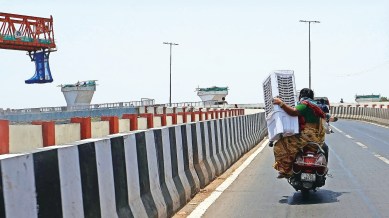📣 For more lifestyle news, click here to join our WhatsApp Channel and also follow us on Instagram
Delhi’s record-breaking heatwave claims first casualty: Here’s how it can worsen certain health conditions
Prolonged exposure to high temperatures and humidity can exacerbate several health conditions. Learn how to manage them

Delhi is experiencing a scorching heatwave, with temperatures reaching the highest recorded in 80 years. Tragically, this extreme heat has already claimed lives. A 40-year-old man from Bihar’s Darbhanga succumbed to heatstroke at Ram Manohar Lohia (RML) Hospital.
The situation at RML Hospital reflects the strain the heatwave is placing on healthcare systems. Dr Ajay Chauhan, Professor of Internal Medicine and Head of the Heat Stroke Unit, told indianexpress.com in a previous interaction that 6-7 patients have been admitted in the past week alone. “Two of them (patients) are still admitted. One of them was a case of heat exhaustion,” he said.
monthly limit of free stories.
with an Express account.
Dr Rakesh Gupta, Senior Consultant, Internal Medicine, Indraprastha Apollo Hospitals, explained that a heatstroke occurs when the body’s temperature regulation system fails, and core body temperature rises to dangerous levels (typically above 104°F or 40°C).
“This can lead to organ damage, particularly in the brain, heart, kidneys, and muscles. Heatstroke can cause seizures, loss of consciousness, and even death, if not treated promptly,” he told indianexpress.com in an interaction.
What are the health conditions a heatwave can worsen?
Prolonged exposure to high temperatures and humidity can exacerbate respiratory illnesses like asthma and chronic obstructive pulmonary disease (COPD) by increasing inflammation and making it harder to breathe, explained Dr Gupta.
According to him, cardiovascular diseases, such as heart failure and coronary artery disease, can also be aggravated due to the added strain on the heart from dehydration and electrolyte imbalances. Heatwaves can also worsen chronic kidney disease, diabetes, and neurological conditions like multiple sclerosis or Parkinson’s disease, he added.
Are there any ways to manage them?
Managing health conditions during a heatwave involves staying hydrated, avoiding strenuous activities, and spending time in cool, air-conditioned environments, said Dr Gupta. “Medications should be taken as prescribed, and individuals should monitor for signs of heat-related illnesses.”
Keeping the home cool, wearing lightweight clothing, and using cooling devices like fans or cool mist humidifiers can help prevent conditions from worsening. Regular communication with healthcare providers is essential for monitoring and adjusting treatment plans as needed.
To keep yourself safe during a heatwave, it’s crucial to stay hydrated, limit outdoor activities during the hottest parts of the day, wear lightweight and light-coloured clothing, and seek air-conditioned environments whenever possible. If you experience symptoms like dizziness, nausea, headache, or rapid heartbeat, seek medical attention immediately.
📣 For more lifestyle news, click here to join our WhatsApp Channel and also follow us on Instagram